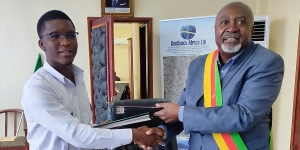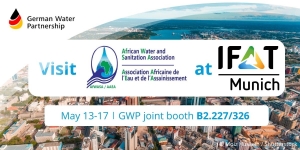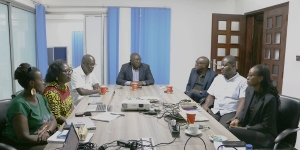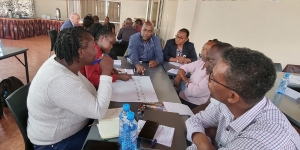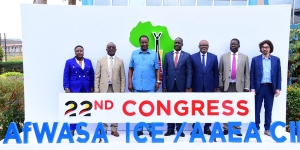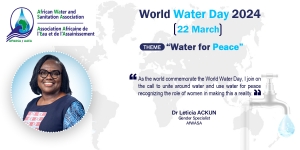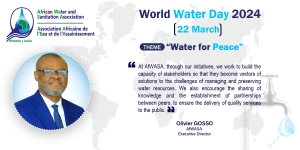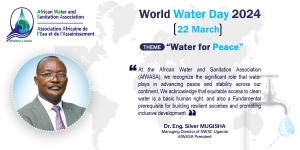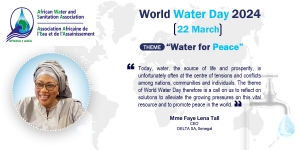Nzickonan Stéphanie
EMPOWERWASH-AFRICA Program: AfWASA on Exploratory Mission to Cameroon
As part of the EMPOWERWASH-AFRICA program, the African Water and Sanitation Association (AfWASA) recently conducted an exploratory mission in Cameroon, specifically in the municipalities of Dschang, Fokoué, Bamendjou and Douala 5. The purpose of this mission was to meet the authorities of these municipalities selected for the implementation of the project, to present the Association and the project, to sign a partnership agreement (MoU) for the successful execution of the project, and finally to encourage these municipalities to become members of AfWASA.
After more than 40 years of involvement in the water and sanitation sector, AfWASA has recognized the need to broaden its scope to include rural areas, in line with Sustainable Development Goal number 6. With the support of the Conrad N. Hilton Foundation (CNHF), the association is implementing the EMPOWERWASH-AFRICA program to meet this imperative.
According to the Program Coordinator Hemez Kouassi, the mission was a success. The municipal authorities met expressed their support and commitment to the EMPOWERWASH-AFRICA program, and partnership agreements were signed as planned with Mr. Jacquis Gabriel KEMLEU TCHABGOU (Mayor of Dschang), Mrs. Adrienne Paule DEMENOU TAPAMO née ZAMDJIO (Mayor of Fokoué), Mr. Xavier TAKAM (Mayor of Bamendjou), and Richard MFEUNGWANG (Mayor of Douala 5). In addition, a training session on the KoboCollect tool was organized, arousing keen interest among participants.
The mission was a resounding success, meeting all its objectives and demonstrating the commitment of Cameroon's municipal authorities to the EMPOWERWASH-AFRICA program. It marks the beginning of a promising partnership to improve access to drinking water and sanitation in rural areas.
Finally, it should be noted that the overall aim of the EMPOWERWASH-AFRICA program is to enable AfWASA to better understand Water, Sanitation and Hygiene (WASH) systems at rural district level, in order to identify best practices, gaps and challenges to improve service delivery performance. The program targets 30 municipalities or rural districts in 6 countries: Burkina Faso, Cameroon, Ethiopia, Ghana, Malawi and Uganda.
IFAT 2024: AfWASA invites you to join its sessions
Dear friends,
We're delighted to share with you our agenda at IFAT .
We look forward to welcoming you for fruitful discussions.
Citywide Inclusive Sanitation: AfWASA to promote sanitation technologies as part of its strategic plan
As part of the Bill & Melinda Gates Foundation's new on-site sanitation strategy, the Foundation's Senior project officer, Dr Mbaye Mbeguere, undertook a two-day working mission to AfWASA headquarters.
The main objective of the mission was to present the Foundation new strategy, to discuss its current investment in the SAO CWIS (City-Wide Inclusive Sanitation) Program, to bring forward its closing date to the end of 2025 instead of 2027, and to draw up an action plan in line with the new deadline.
During the two days of discussions, the activities planned to this end were reviewed, priorities were identified and a clear roadmap was drawn up to ensure that the planned activities are fully implemented.
At the end of the proceedings, Dr Mbaye expressed his satisfaction with the discussions. He highlighted the Foundation's ambition to make AfWASA a leading center of learning on inclusive sanitation in Africa, hence the importance of reorienting existing activities to meet this crucial objective.
Dr. Siméon Kenfack, AfWASA's Director of Programs, who represented the Executive Director at the meeting, said he was particularly pleased with the exchanges, which enabled the Foundation's new orientations to be clearly understood, and AfWASA's strategy to be aligned with them.
The new strategy of the Bill & Melinda Gates Foundation aims, among other things, to promote sanitation technologies to enable poor households, particularly in Africa, to have toilets at home.
Water quality: AfWASA organizes training on fluoride removal from freshwater
From April 24 to 26, 2024, AfWASA in collaboration with its German partners from the German Water Partnership organized a training session on "Fluoride Removal from Fresh Water at Community and Household Levels - Innovative Filter-Technology for clean, Safe and Affordable Drinking Water".
The training course, part of AfWASA's capacity-building mission, took place in person in Nakuru, Kenya, and was attended by some 50 participants from Côte d'Ivoire, Ethiopia, Kenya, Senegal and Tanzania.
Fluorine is a natural element in the earth's crust, found in water in varying concentrations depending on the geological characteristics of the subsoil. Consumed in small quantities, it prevents tooth decay. But above a threshold set by the World Health Organization (WHO) at 1.5 milligrams (mg) of fluoride per liter of water, it attacks teeth and settles on bones. People who regularly consume water too rich in fluoride are at risk of suffering from fluorosis.
The training was delivered by Dipl.-Ing. Johannes Münz, Managing Director of Harbauer Kenya and Ms Margaret Maïna, Water Quality Specialist, Managing Director of Limuru Water and Sewerage Company (LWSC), Kenya. Through presentations, case studies and group work, the trainers taught participants simple techniques and presented innovative technologies for removing excess fluoride from drinking water.
At the end of the session, participants expressed their satisfaction with the way the sessions had been run, and with the quality of the information they had received. They decided to set up a sub-group within the AfWASA "Water Quality" Specialist Group to continue exchanges and share experiences.
22nd AfWASA International Congress and Exhibition: launching ceremony held in Kampala, Uganda
The official launching ceremony of the 22nd AfWASA International Congress and Exhibition took place this Tuesday, March 26, 2024 in Kampala, Uganda.
The theme of the event, scheduled for February 16 to 20, 2025 at the Speke Resort Convention Centre, Munyonyo, is: Water and sanitation for all: a secure future for Africa. It will bring together around 4,000 water and sanitation stakeholders from various regions of the world to share experiences, exchange ideas and collaborate on best practices and policies for the growth of the sector.
Speaking at the launch, Dr Silver Mugisha, Managing Director of National Water and Sewerage Corporation (NWSC), the event's host, said the congress will be an opportunity to assess progress in access to water and sanitation services across the continent. It will also provide delegates with opportunities for networking and business partnerships.
For his part, AfWASA Executive Director, Mr. Olivier Gosso, expressed his gratitude to NWSC for agreeing to host the event for the 3rd time. He affirmed that this congress will be exceptional in terms of the number of participants, the scientific content and the progress Africa will have made in the water and sanitation sector, for the benefit of Africans.
It is worth noting that the 22nd AfWASA International Congress and Exhibition was originally scheduled for February 18-22, 2024 in the Republic of Guinea. However, for reasons of force majeure in Conakry, the Guinean capital, the congress was first postponed and then cancelled.
WWD 2024: Message from the Gender Specialist of AfWASA
As the world commemorate the World Water Day, I join on the call to unite around water and use water for peace recognizing the role of women in making this a reality. Being mindful of the fact that water is not only a resource to be used and competed over but also a human right there is the need to consciously involve women as major stakeholders to pave the way for a more harmonious society and the maintenance of peace.
WWD 2024: Message from the Executive Director of the African Water and Sanitation Association
On this significant day, 22 March 2024, the whole world celebrates World Water Day, with the theme "Water for Peace". Water, a vital resource, transcends borders and cultural differences, constituting an essential pillar for the survival of all forms of life on our planet. Unfortunately, it is often the subject of conflict and tension.
At AfWASA, through our initiatives, we work to build the capacity of stakeholders so that they become vectors of solutions to the challenges of managing and preserving water resources. We also encourage the sharing of knowledge and the establishment of partnerships between peers, to ensure the delivery of quality services to the public. We are convinced that this commitment will ensure equitable access to drinking water and promote sustainable management of this precious resource for future generations in Africa.
Happy World Water Day to everyone!
WWD 2024: Message from the Managing Director of Société de Distribution d'Eau de Côte d'Ivoire
Water is the source of life, just as it is the foundation of peace. Let's work together to preserve it today, and to ensure the prosperity and harmony of future generations.
WWD 2024 : Message from the President of AfWASA, Managing Director of National Water and Sewerage Corporation, Uganda
On this opportune occasion of World Water Day, I extend my heartfelt greetings to each one of you as we join hands to celebrate and reflect upon the Invaluable significance of sustainable Access to water and Sanitation to our livelihoods. As we unite under the theme "Water for Peace," we are reminded of the profound interconnection between access to water and the pursuit of global harmony. Water, indeed, is not merely a vital resource for sustaining life but also a catalyst for fostering social cohesion, Economic prosperity, and environmental sustainability.
At the African Water and Sanitation Association (AfWASA), we recognize the significant role that water plays in advancing peace and stability across Our continent. We acknowledge that equitable access to clean water is a basic human right, and also a fundamental prerequisite for building resilient societies and promoting inclusive development. As stewards of water resources, it is incumbent upon us to redouble our efforts and reaffirm our commitment to ensuring universal access to safe and reliable water services for all. Through collaborative partnerships, innovative solutions, and community engagement, we can address the challenges of water scarcity, pollution, and inadequate infrastructure.
Let us recommit ourselves to the noble cause of ensuring that every individual, regardless of their circumstances or location, has the basic human right to clean water and sanitation. Together, we can turn the tide of adversity into opportunity and pave the way for a brighter, more equitable future for generations to come.
I extend my deepest gratitude to each one of you for your firm dedication and tireless commitment to the noble mission of AfWASA. Let us seize this Momentous occasion to reaffirm our Collective resolve and take decisive action towards realizing our shared Vision of a world where every individual Can sustainably access safe water, and sanitation.
Thank you !
WWD 2024: Message from the Chief Executive Officier of DELTA SA
Today, water, the source of life and prosperity, is unfortunately often at the centre of tensions and conflicts among nations, communities and individuals. The theme of World Water Day therefore is a call on us to reflect on solutions to alleviate the growing pressures on this vital resource and to promote peace in the world. This reflection will lead us to explore various strategic points aimed at preventing water-related conflicts and promoting more equitable and sustainable management of this crucial resource for humanity.
-
A few points to help prevent water-related conflicts
-
Invite cross-border countries to conclude cooperation agreements on the shared management of water resources. According to a UN report, only 24 countries have concluded cooperation agreements for all their shared water resources.
-
Establish dialogue and diplomacy: That means encouraging dialogue between the stakeholders concerned, including governments, international organisations, NGOs and local communities, in order to resolve water-related conflicts through diplomacy and mediation.
-
Integrated water resources management: Adopting an integrated approach to water management, taking into account social, economic, environmental and political aspects in order to prevent tensions linked to water scarcity or poor water management. By way of illustration, we can cite the report on the MDGs 2022, where around two billion people do not have access to drinking water, which may be due to poor water management.
A few points to promote a more equitable and sustainable management of water resources
-
Conservation and protection of aquatic ecosystems: protecting aquatic ecosystems such as rivers, lakes and wetlands, which provide vital ecosystem services such as water purification and flow regulation, thereby contributing to the sustainability of water resources.
-
Protecting human rights to water and sanitation: guaranteeing universal access to drinking water and adequate sanitation by recognising water as a fundamental human right, in order to reduce inequalities and ensure security for all.
-
Limiting global warming: with the aim of reducing the increase in water stress, particularly water shortages.
By implementing these various strategic points, we can make progress towards more equitable, sustainable and peaceful management of water resources worldwide.

 English
English  Français
Français 
